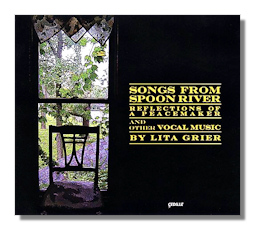
The Internet's Premier Classical Music Source
Related Links
- Latest Reviews
- More Reviews
-
By Composer
-
Collections
DVD & Blu-ray
Books
Concert Reviews
Articles/Interviews
Software
Audio
Search Amazon
Recommended Links
Site News
 CD Review
CD Review
Lita Grier

Songs
- 5 Songs for Children (1962/1999)
- Sneezles (1972)
- 4 Songs from "A Shropshire Lad" (1955)
- 2 Songs from Emily Dickinson (1961)
- Songs from "Spoon River" (2004-07)
- Reflections of a Peacemaker (2007)
Michelle Areyzaga & Elizabeth Norman, sopranos
Scott Ramsay, tenor
Robert Sims, Alexander Tall & Levi Hernandez, baritones
Anne Bach, oboe
Tina Laughlin, percussion
Welz Kauffman, William Billingham & John Goodwin, pianos
Chicago Children's Choir/Josephine Lee
Cedille Records CDR90000112 DDD 67:45
Summary for the Busy Executive: A find.
Lita Grier studied with Lukas Foss and Roy Harris. Her early work garnered both prizes and good word-of-mouth. Around 1962, she gave up her composition career, probably because she couldn't face either the attacks against neoclassicism in general from the serialist wing or the animus against women composers in the not-missed days before the feminist movement. She went into various other careers including arts management and broadcasting. I couldn't find an entry for her in my edition of Grove. When the pendulum swung back and requests for works began to come in, she returned to composition.
This compilation of songs shows Grier early to late. I don't hear much of a difference, but I attribute that to the large gap in her composing activity. I'm not that big on many of the songs, for various reasons, but I like Grier and want to hear more.
Some of the songs use terrible texts. I've never cared for Mattie Stepanek's poetry, although his advocacy and his death two weeks short of his fourteenth birthday from muscular dystrophy certainly makes for a compelling, useful life. His poetry I consider blush-making junk. Thick whimsy exercises a fatal attraction on Grier (she actually set A.A. Milne's cringeworthy Sneezles as well). To be fair, she wrote it for her own child, sick at the time, and the music itself is delightful, with elegantly subtle parts for percussion. However, many of these settings come off as songs, which I think a tribute to Grier's art.
She certainly has craft and the gift of surprise. Often I found her leading me down certain paths almost to the point of predictability, only to turn to someplace completely unexpected. The early Housman settings are good, but I kept thinking of other, better settings by Butterworth, Moeran, Leichtling, and (of course) Vaughan Williams. As regular readers know, I also don't get into most of the poetry of Emily Dickinson. Grier sets two of the poet's most popular pieces: "I cannot live with you" and "I taste a liquor never brewed." I've yet to understand the attraction of the latter poem to composers. It's essentially a riddle (answer: "oysters") and really doesn't get much beyond that. Nevertheless, Grier makes things interesting. She breaks up the general monotony of Dickinson's meters, à la Aaron Copland's Dickinson cycle. She finds an idiom that somewhat relates to nineteenth-century parlor music, like Gordon Getty's White Election, but she doesn't go as far as Getty. The music here doesn't abstract or distill the earlier idiom; it suggests.
Although I admired the choral writing of Reflections of a Peacemaker, my favorite work on the CD comes down to Songs from Spoon River. It's a dramatic cycle for several solo singers and two pianos. Perhaps Brahms's Liebeslieder lurked in the back of her mind. Edward Arlington Robinson's cycle, based on The Greek Anthology, has the ghosts of a small Illinois town speaking about their lives and the significance or lack of it in their lives. Classical fatalism is all over these verses: We all die; most of us die unhappy; death becomes for most a soothing, endless sleep. The poems Grier selects generally run long, in free verse, to boot. For a composer, the problem is how to keep from rambling, since the structure isn't apparent. To deal with this, you can follow either of two general strategies: follow the twists and turns, without "Mickey-Mousing," and hope that your music doesn't fall apart; find a structure that won't do violence to the poem. Grier takes the first road, building in coherence through a sophisticated motific development and a genuinely dramatic touch. Her ability to characterize individuals insures that the dead don't sound all alike. Of course, specifying different voices helps. This work prompted me to consider Grier as something other than a miniaturist. You sense a big nature behind the notes. I'd love to hear her tackle something bigger. Lukas Foss and Roy Harris, I'm sure, did their work well.
The singers are professional, though not stellar quality, with one significant exception. It often sounds like a recital of very good students. However, Michelle Areyzaga stands out as a singer who reaches out to a listener without resorting to hokey vocal clichés. The various pianists accompany sensitively, giving the singers room. The Chicago Youth Choir is so good of its type that most of the time it fooled me into thinking it an adult choir. Occasionally, however, you heard the youth of the voices. They certainly go a long way to putting over the Stepanek. Cedille, a label devoted to Chicago composers and performers, should issue more Grier.
Copyright © 2010, Steve Schwartz.




















